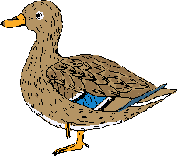The newness of spring changed into the lazy days of summer. Except for an occasional repair of the dam, the beavers were unmotivated to cut any trees. It was a time of abundance for beaver and duck alike because they could now dine on a wide selection of plants. Without leaving the water they feasted on duckweed, water lilies, and watercress. Close by grew ferns, mushrooms, wild grasses, and berries. Miena enjoyed an occasional bug or minnow. Dooro, too, welcomed the change in menu and only occasionally ate willow or aspen, a staple during the winter months. The flourishing plant life of the beaver pond attracted other animals. It was not uncommon to see deer, raccoons, skunk and bear, although the beavers were always nervous when a bear was around. Bears had been known to tear apart beaver lodges.
Meanwhile the ducklings and kits turned into young ducks and beavers. Nature was preparing the ducklings for their winter flight. Early on they had lost their down and begun growing flight feathers. And while the young beavers would not be independent until two years old, by the end of summer at half their adult size, they were fully capable of patching the dam or felling a tree.
Throughout the summer Miena and Dooro continued to have their special conversations. Where Dooro was, there was Miena -- and vice versa. To Dooro, what few beaver conversations he had had, became boring in comparison. As for Miena, well, she had no one else to talk to and grew to prefer it that way.
All too soon the light of day began to shorten and by the end of September the beavers were once again hard at work. With increased cloud cover and colder weather the ducks appeared nervous, watching the sky and looking southward. Their quacking became more frequent and if any one of them took flight, the others watched mesmerized until it had landed. Some of the birds took flight and didn't return. The distant honking of geese and their flying "V" patterns was a bugle call to those with migratory instincts.
The beavers hurried to cut trees for storing in woodpiles underwater. With stones they weighted down successive layers of wood at the bottom of the pond. Because the pond was too deep to freeze all the way to the bottom, this would be their food through the winter. As always Dooro worked extra hard and Miena followed him constantly. If he hadn't enjoyed her company so much he might have realized, as did all the other residents of the pond, that at this time of year this was odd behavior. Miena didn't watch the sky or look southward like the other ducks.
 It was only after most of the ducks had left the pond and Dooro had begun fortifying his lodge with mud, that he thought to question Miena about it. He was patting the mud carefully onto the dome of his lodge, a master plasterer striving to cover every bit of exposed surface.
It was only after most of the ducks had left the pond and Dooro had begun fortifying his lodge with mud, that he thought to question Miena about it. He was patting the mud carefully onto the dome of his lodge, a master plasterer striving to cover every bit of exposed surface.
"Miena, when are you going to leave with the others?" he said, worry edging his voice.
Miena hesitated. "There's time." Momentarily she tucked her head under her wing, and then shook her feathers.
Dooro persisted. "But almost all the other ducks have already left.
"That's not true. There are ducks left."
Dooro didn't want to argue. He preferred making a suggestion. "Well, at least I hope you plan on leaving with them when they do leave."
Miena looked away and didn't respond. The subject wasn't mentioned again for a while.

